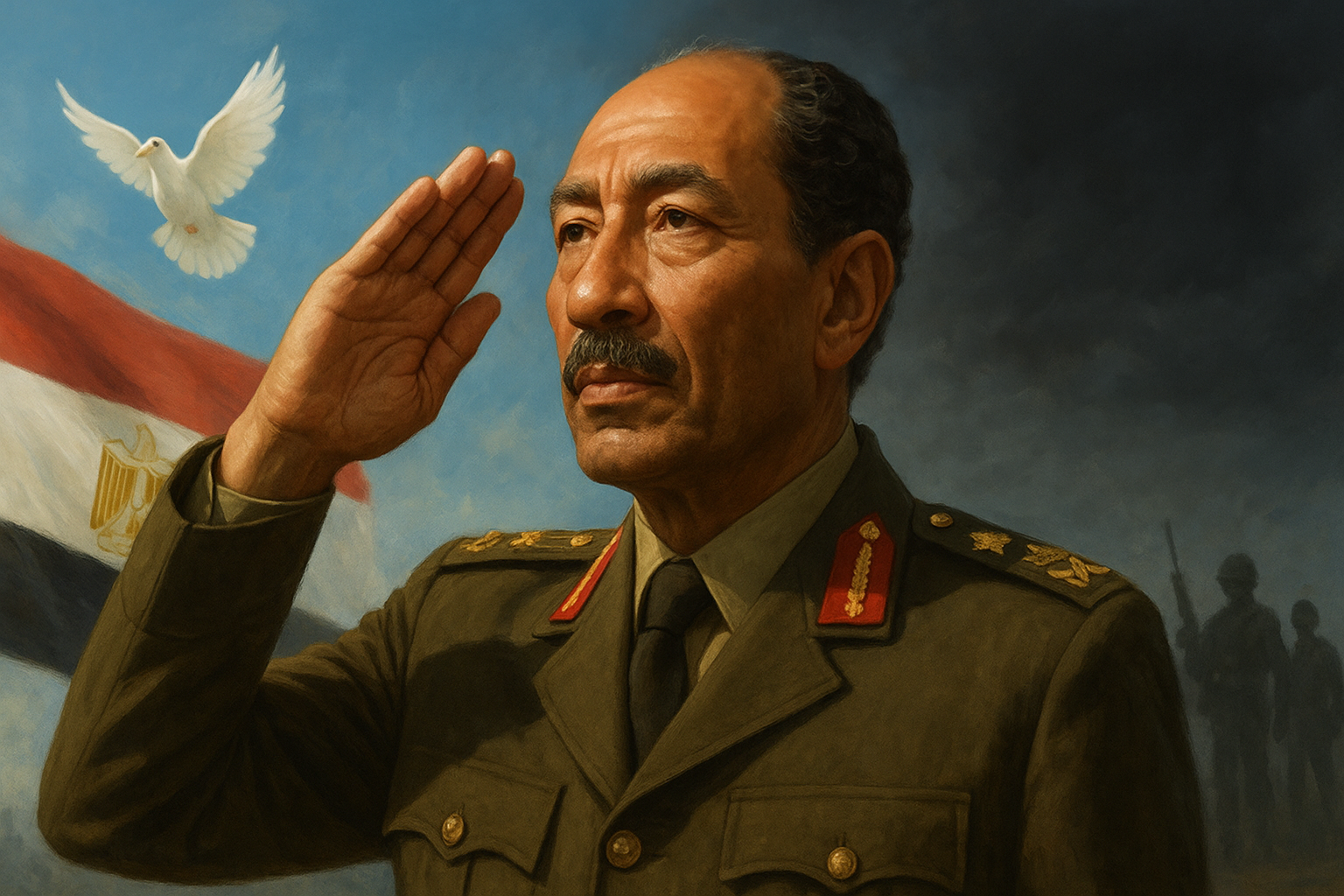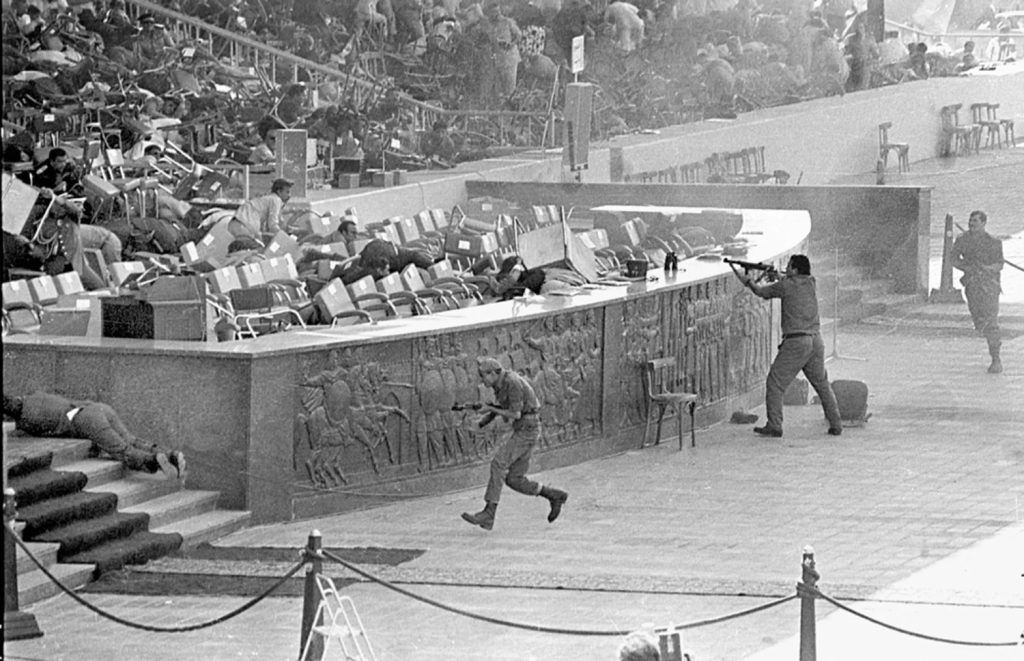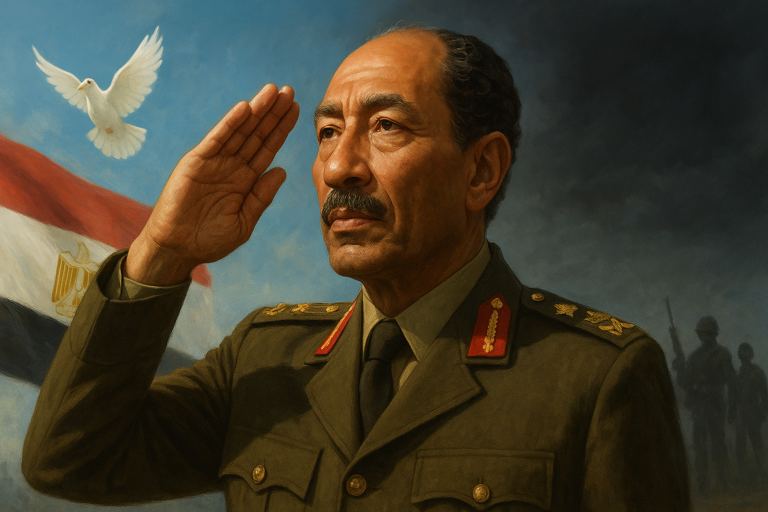
Traitor or Hero? The Truth Behind Anwar el-Sadat
The Price of Peace: The Story of Egyptian President Anwar el-Sadat and His Tragic End
In the heart of the Middle East, a figure emerged from the confusion of wars, betrayals, and broken promises. Anwar el-Sadat, president of Egypt from 1970 to 1981, was a complex leader. Admired by many as a visionary for signing peace with Israel, hated by others as a traitor for that very same act. His life, work, and assassination deeply marked not only Egypt but the entire region. This is his story, told with respect for the facts and their power.
A Man Between Two Worlds
Sadat came to power after the death of Gamal Abdel Nasser in 1970, inheriting an Egypt in crisis: indebted, centralized, militarized, and deeply aligned with the Soviet Union. Although he began as part of the same pan-Arabist regime, his vision soon diverged. Sadat wanted an Egypt free from Soviet tutelage, with greater economic openness and a more pragmatic approach to the conflict with Israel.
In 1973, he led the Yom Kippur War alongside Syria. Though initially victorious, the war became bogged down and left the country exhausted. But Sadat did not want Egypt to die in endless wars. In 1977, he did the unthinkable: he flew to Jerusalem and spoke before the Israeli Parliament. That historic gesture opened the path toward the Camp David Accords, signed in 1978 with then–Israeli Prime Minister Menachem Begin, under the mediation of U.S. President Jimmy Carter.
The Price of Peace
The peace treaty with Israel made Sadat the first Arab leader to formally recognize the State of Israel. It earned him the Nobel Peace Prize… and, at the same time, a symbolic death sentence in the Arab world. Egypt was expelled from the Arab League. Sadat was accused of treason by multiple groups: radical Islamists, pan-Arab nationalists, and resentful members of the military.
Meanwhile, on the economic front, Sadat launched an open-door policy called Infitah (openness), meant to attract foreign investment and partially privatize state sectors. But liberalization without an orderly transition fueled corruption and mainly benefited a small elite close to power. Meanwhile, food prices soared, subsidies were reduced, and discontent grew.
A Foretold Assassination On October 6, 1981, during a military parade commemorating the victory in the 1973 war, a group of Islamist soldiers infiltrated the event and opened fire on the president. Anwar el-Sadat was killed in broad daylight, in front of cameras.The assassins belonged to the organization Al-Jihad, a radical Islamist faction and ideological predecessor of what would later become Al-Qaeda. These extremists were convinced that Sadat had betrayed the principles of Islam by recognizing Israel and repressing Islamist movements at home.

Among the conspirators was Ayman al-Zawahiri, who years later would become the leader of Al-Qaeda after the death of Osama bin Laden.
What Did the Assassins Want?
The attackers were not simply isolated fanatics. They were part of an ideological current known as Radical Political Islam, which combines religion, nationalism, and total opposition to the West, to Israel, and to any form of modernization not under religious control.
They believed Egypt had to be governed by sharia law, that peace with Israel was a humiliation, and that the state had to be fully Islamized. But it was also a reaction against Sadat’s authoritarianism: while he promised economic liberalization, he maintained harsh political repression.
Sadat’s Legacy: Vision or Ruin?
Today, Sadat’s figure continues to divide opinions. On one hand, he promoted peace, broke with Soviet totalitarianism, and allowed some degree of economic opening. On the other hand, his government was far from free: he persecuted dissidents, monopolized power, and used the state apparatus to benefit his allies.
His death paved the way for Hosni Mubarak, who consolidated a dictatorship that lasted three decades. It was the cost of a forced and poorly managed transition toward openness without strong institutions.





